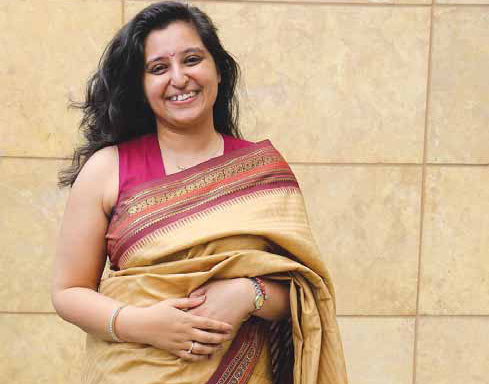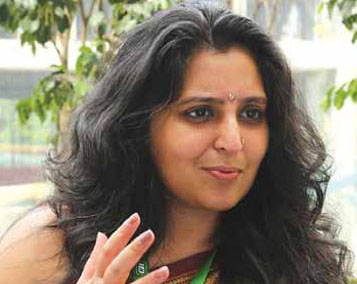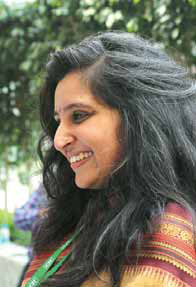Issue No.18 / November 16-30,2015

Anjali Byce, Director, Human Resources at SKF India, is one of India’s dynamic and vibrant corporate women, who has handled multiple-functional excellence areas including strategic HR, industrial relations, organisational development, learning and development, corporate social responsibility, health, safety and environment and administration. She speaks to Corporate Citizen in-depth about the role of HR in today’s times, her career while also touching upon her personal space
Anjali’s thrust has been in driving change through multiple business transformation programmes, implementation of a culture-based HR strategy, capability building, Six Sigma and diversity initiatives, to name a few. Her experience in HR spans across manufacturing, insurance and R&D companies, as well as start-up, acquisition and turnaround companies. She has worked with Tata Motors, Allianz Bajaj Life Insurance Co, Cummins in the past and now with Thermax. Anjali Byce has been named as one of the 100 most talented Global HR Leaders by CHRO Asia. She currently co-chairs Th e Confederation of Indian Industry (CII) HR & IR Council in Pune and is also a member of the CII National Committee on Industrial Relations. She has also held the position of President of National Human Resource Development Network Pune Chapter. She holds a Bachelor of Arts (Honours) degree in Psychology from Lady Shri Ram College, Delhi and a Master’s degree in Applied Psychology from Delhi University where she did her thesis on Psychological Contracting. She obtained her PGDHRD from Symbiosis Centre for HRD – Pune and has an Advanced Certificate in Marketing from Chartered Institute of Marketing (UK).
Doing what you enjoy and enjoying what you do make every profession great fun. I’ve worked in start-up companies, turnarounds and been part of acquisitions. Each of these has taught me a lot. It’s made me realise how our fundamentals remain the same, but the application is so different, depending on the business and demographic of the workforce. All these experiences have challenged me, and pushed me into unexplored domains. I loved the thrill. It’s an honour being a part of creating a legacy and a brick of their history. I’ve also worked across functions. Th is has helped me have a more balanced view of business issues and levers that impact and create high-performing organisations. Another aspect that I cherish is the interactions with diverse My personal experience has been that employees use HR as a sounding board and a friend who provides honest and candid Doing what you enjoy and enjoying what you do make every profession great fun. I’ve worked in start-up companies, turnarounds and been part of acquisitions. Each of these has taught me a lot. It’s made me realise how our fundamentals remain the same, but the application is so different, depending on the business and demographic of the workforce. All these experiences have challenged me, and pushed me into unexplored domains. I loved the thrill. It’s an honour being a part of creating a legacy and a brick of their history. I’ve also worked across functions. Th is has helped me have a more balanced view of business issues and levers that impact and create high-performing organisations. Another aspect that I cherish is the interactions with diverse My personal experience has been that employees use HR as a sounding board and a friend who provides honest and candid
My personal experience has been that employees use HR as a sounding board and a friend who provides honest and candid feedback

Th is helps bring in sustainable processes and encourages employees to question the status quo (a key principle in continuous improvement). Additionally, it drives a culture of experimentation and tolerance for mistakes
Yes, we are very proud of the talent in our company. They come with the right competence, attitude and values. Th is, in my view, is a result of a powerful jugalbandi between determining ‘the right talent needs’ and a strong ‘selection process’. Having said this, introduction of more practical knowledge in our academic institutes, encouraging thought leadership and staying relevant and current will help students hit the ground when they transit from campus to corporate life.
My personal experience has been that employees use HR as a sounding board and a friend who provides honest and candid feedback. A true HR professional acts as a strong bridge between business and employees. Being an effective business partner implies driving right behaviour's that create winning teams and businesses.
Someone has very rightly said that all successful and unsuccessful people have one thing in common—24 hours a day! It’s how they use them that makes the difference. I therefore don’t believe anyone who says they don’t have the time. I work hard but I play hard too. I love driving to places, listening to music, dancing, reading, having fun with family… it depends on how you prioritise and do what is meaningful.
Th ere is a whole new world out there waiting for you. Be bold to experiment and drive positive meaningful change, be a student all your life, respect differences, and do what’s right and do it to your best ability, not just what’s easy. I’ll be here cheering in the wings!
It’s important to ensure that every time a ball drops, we reflect as an organisation on ‘what could have prevented it’. This helps bring in sustainable processes and encourages employees to question the status quo (a key principle in continuous improvement)

By Joe Williams